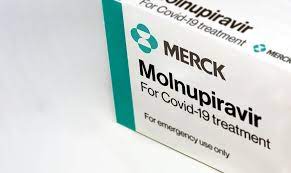The United Kingdom has given Merck’s coronavirus antiviral, the first tablet proved to successfully treat COVID-19, conditional approval. It’s the first country to approve the medication; however, it’s unclear how soon the pill will be available.
Adults 18 and older who have tested positive for COVID-19 and have at least one risk factor for severe diseases, such as obesity or heart disease, can take the tablet. The medicine, molnupiravir, is meant to be given twice a day for five days by persons who have mild to moderate COVID-19 at home.
An antiviral drug that minimizes symptoms and speeds recovery could be revolutionary, reducing hospital caseloads and helping to prevent outbreaks in poorer nations with shaky health systems. It would also support the pandemic’s two-pronged approach, which includes both treatment and prevention, notably through vaccinations.
Molnupiravir is also being evaluated by regulators in the United States, the European Union, and other countries. The US Food and Drug Administration announced last month that a team of independent experts would assemble in late November to examine the pill’s safety and effectiveness.
There will be a limited number of supplies available at first. Merck has stated that it will be able to produce 10 million treatment courses by the end of the year, but the majority of that supply has already been purchased by governments throughout the world.
Officials in the United Kingdom stated in October that they had secured 480,000 courses of molnupiravir and that thousands of disadvantaged Britons would receive the therapy this winter as part of a national study.
“Today is a momentous day for our country,” Britain’s health secretary, Sajid Javid, said. “The UK is now the first country in the world to approve an antiviral that can be taken at home for COVID-19.”
“We’re working quickly across the government and with the NHS to lay out plans to get molnupiravir to patients as soon as possible through a national trial,” he said in a statement, referring to the United Kingdom’s National Health Service. The treatment would be especially beneficial for patients who do not respond well to immunization, according to doctors.
Merck and its partner Ridgeback Biotherapeutic have applied to regulators around the world for approval of the medicine to treat people with mild-to-moderate COVID-19 who are at risk of serious disease or hospitalization. That’s the same group of people who get infused COVID-19 antibody medicines, which are the standard of care in many countries for patients who don’t need to be admitted to the hospital.
Last month, Merck released preliminary findings showing that its medicine reduced hospitalizations and deaths in patients with early COVID-19 symptoms by half. The findings have yet to be peer-evaluated or published in a peer-reviewed publication.
The business also didn’t offer much about molnupiravir’s side effects, other than to remark that the rates of those issues were comparable between individuals who received the treatment and those who got dummy tablets.
The medicine works by adding faults into the coronavirus’s genomic code, slowing its capacity to spread and take over human cells. Because of this genetic activity, several independent scientists have questioned whether the medicine could trigger mutations that lead to birth abnormalities or malignancies.
Molnupiravir’s ability to interact with DNA and produce mutations was researched “extensively” and deemed not to pose a risk to humans, according to the Medicines and Healthcare Products Regulatory Agency in the United Kingdom.
“Studies in rats demonstrated that (molnupiravir) may produce detrimental effects to the unborn progeny,” the FDA said in an email. “However, similar effects were not detected in other animals, and these doses were higher than those that will be given to humans.”
Both men and women were told to use contraception or refrain from sex in workplace trials. The study did not include pregnant women. Merck claims that the medicine is safe when taken as prescribed.
Molnupiravir was first investigated as a possible flu treatment with US government funding. Emory University researchers chose to repurpose the medicine as a potential COVID-19 treatment last year. Ridgeback and its partner Merck were then granted a license to market the medicine.
Merck agreed this week to allow other drugmakers to manufacture its COVID-19 tablet, a move aimed at providing access to millions of people in developing countries. Merck will not collect royalties under the arrangement as long as the World Health Organization considers COVID-19 to be a worldwide emergency, according to the Medicines Patent Pool, an UN-backed organization.
However, some campaigners have criticized the agreement for ignoring major middle-income countries capable of producing millions of treatments, such as Brazil and China.
Despite this, experts praised Merck for agreeing to disclose its formula publicly and committing to assist any companies that require technical assistance in developing their medicine – something that no coronavirus vaccine manufacturer has consented to.
“Unlike the grotesquely unequal distribution of COVID-19 vaccines, the poorest countries will not have to queue for molnupiravir,” Dr. Mohga Kamal-Yanni, a senior health consultant for the People’s Vaccine Alliance, said. Poor countries have received less than 1% of the world’s COVID-19 vaccines, and doctors are hoping that easier-to-distribute therapies will help them combat the pandemic.
Merck had already established licensing agreements with numerous Indian generic medicine manufacturers to produce low-cost versions of molnupiravir for underdeveloped countries.
According to reports, the United States paid about $700 per course of medicine for about 1.7 million treatments. Merck wants to utilize a tiered pricing system for underdeveloped countries, according to the company. According to a study conducted by Harvard University and King’s College London, the medicine costs around $18 to produce. While additional treatments for COVID-19, including as steroids and monoclonal antibodies, have been approved, they are provided by injection or infusion and are typically reserved for hospitalized patients

















